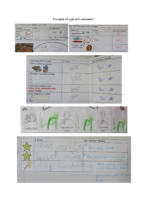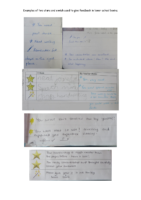Assessment & Feedback
Ongoing assessment and good quality feedback play key roles in helping pupils to improve and progress.
Small class groups and high pupil / teacher ratios mean that teachers know the pupils in their class very well and constantly assess them in order to support their individual learning needs. This on-going assessment means misunderstandings can be quickly addressed and pupils are stretched and challenged in their learning and understanding.
Assessment
Assessment is used to recognise achievement and record progress made from known starting points. It is also an important part of the evaluation and review of lessons that teachers undertake before planning subsequent lessons. It is used to monitor pupils’ progress against their individual targets and to identify any areas of difficulty which we need to plan for. We also assess how pupils are progressing against National Curriculum age related expectations.
Assessment takes a variety of different forms:
- In class assessment through questioning, observation and discussion.
- Marking of written classwork and home learning.
- Pupils’ self and peer assessment (Download below) against learning criteria.
- With older pupils more formal assessment is introduced e.g. end of topic assessments and weekly spellings and times tables tests.
- Accelerated reading quizzes.
- Assessment in collaboration with other agencies e.g. Speech and Language Therapists or Deaf CAMHS
At the end of each key stage (EYFS, KS1 Year 2 and KS2 Year 6) pupils are assessed in line with Statutory National Curriculum SATs requirements. This involves teacher assessment for all pupils within the year group, moderated within the department and between other schools. Pupils in years 2 and 6 may also take nationally set SATs exams during the summer term.
Assessment within Lower School is based on what pupils can do and have learnt and this is recorded in a variety of ways depending on the needs, stage and age of the pupils. This ranges from the identification of ‘next steps’ as part of learning, through to the formal Heathlands Tracker (Download below), matched to NC requirements.
Within the Early Years Foundation Stage comprehensive individual learning journals are used to record pupil progress against the EYFS curriculum and next steps are identified.
All pupils in Lower School have individual targets displayed in their classrooms which are regularly updated. Children take responsibility for recording their own progress against these targets.
Progress Monitoring
Every term the staff review each pupil’s progress to ensure they are “on track”. Staff consider the child’s progress with learning, behaviour, attendance and personal development. Any concerns identified during these meetings are addressed and all is recorded on the pupil progress monitoring form (Download below).
Parents’ consultation evenings happen in the autumn and spring terms and in the summer term there are the longer statement or Education Health and Care Plan review meetings. However, other meetings may be called to discuss any specific issues as they arise so they can be addressed swiftly. Parents may request a meeting with their child’s teacher at any time.
Feedback
Feedback is hugely important to enable pupils to know what they have done well and what they can do to improve. Feedback is often linked to success criteria but may also be about attitude to learning and other skills pupils are demonstrating.
Feedback is given verbally both individually and to the whole class, as well as in a recorded form in pupil books. One of the main approaches to marking which can be seen in pupil books is to use “Two stars and a wish” (Download below). The stars relate to what the pupil has done well and wish to the next step or an area the pupil needs to improve.
As pupils become older they learn to give feedback to their peers in constructive ways as well as extending their own skills in self-assessment.



